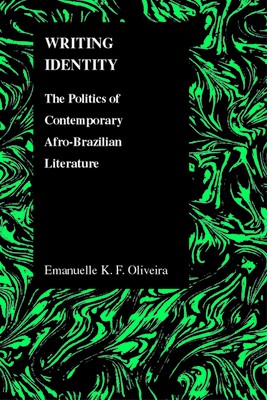
- We will send in 10–14 business days.
- Author: Emanuelle K F Oliveira
- Publisher: Purdue University Press
- Year: 2007
- Pages: 260
- ISBN-10: 1557534853
- ISBN-13: 9781557534859
- Format: 16.7 x 22.8 x 1.7 cm, minkšti viršeliai
- Language: English
- SAVE -10% with code: EXTRA
Reviews
Description
In the late 1970s, Brazil was experiencing the return to democracy through a gradual political opening and the re-birth of its civil society. Writing Identity examines the intricate connections between artistic production and political action. It centers on the politics of the black movement and the literary production of a Sao Paulo-based group of Afro-Brazilian writers, the Quilombhoje. Using Pierre Bourdieu's theory of the field of cultural production, the manuscript explores the relationship between black writers and the Brazilian dominant canon, studying the reception and criticism of contemporary Afro-Brazilian literature. After the 1940s, the Brazilian literary field underwent several transformations. Literary criticism's displacement from the newspapers to the universities placed a growing emphasis on aesthetics and style. Academic critics denounced the focus on a political and racial agenda as major weaknesses of Afro-Brazilian writing, and stressed, the need for aesthetic experimentation within the literary field. Writing Identity investigates how Afro-Brazilian writers maintained strong connections to the black movement in Brazil, and yet sought to fuse a social and racial agenda with more sophisticated literary practices. As active militants in the black movement, Quilombhoje authors strove to strengthen a collective sense of black identity for Afro-Brazilians.
EXTRA 10 % discount with code: EXTRA
The promotion ends in 21d.02:15:57
The discount code is valid when purchasing from 10 €. Discounts do not stack.
- Author: Emanuelle K F Oliveira
- Publisher: Purdue University Press
- Year: 2007
- Pages: 260
- ISBN-10: 1557534853
- ISBN-13: 9781557534859
- Format: 16.7 x 22.8 x 1.7 cm, minkšti viršeliai
- Language: English English
In the late 1970s, Brazil was experiencing the return to democracy through a gradual political opening and the re-birth of its civil society. Writing Identity examines the intricate connections between artistic production and political action. It centers on the politics of the black movement and the literary production of a Sao Paulo-based group of Afro-Brazilian writers, the Quilombhoje. Using Pierre Bourdieu's theory of the field of cultural production, the manuscript explores the relationship between black writers and the Brazilian dominant canon, studying the reception and criticism of contemporary Afro-Brazilian literature. After the 1940s, the Brazilian literary field underwent several transformations. Literary criticism's displacement from the newspapers to the universities placed a growing emphasis on aesthetics and style. Academic critics denounced the focus on a political and racial agenda as major weaknesses of Afro-Brazilian writing, and stressed, the need for aesthetic experimentation within the literary field. Writing Identity investigates how Afro-Brazilian writers maintained strong connections to the black movement in Brazil, and yet sought to fuse a social and racial agenda with more sophisticated literary practices. As active militants in the black movement, Quilombhoje authors strove to strengthen a collective sense of black identity for Afro-Brazilians.


Reviews